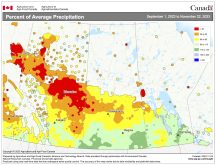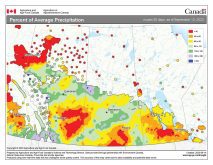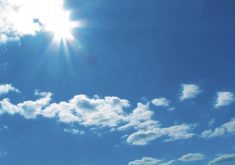With more and more people gaining access to the Internet I felt it was time to start listing some of my favourite weather websites. While I originally thought I would easily fit this into one article, I have discovered I have a lot of favourite websites! So over the next month or so, I will list and describe what I think are some the most valuable weather websites out there.
People may argue about some of the problems associated with the rapid proliferation of information now available via the Internet, but you can’t really argue about the ease at which some very useful information can now be obtained. This is especially the case in the area of weather and climate. It wasn’t that many years ago when the only places you could find detailed weather information were either at the weather office, university or a media outlet. In the case of the two latter locat ions, someone would have been paying to have the information made available to them. The weather hobbyist or independent expert could rarely afford to access this valuable information.
Read Also

June brings drought relief to western Prairies
Farmers on the Canadian Prairies saw more rain in June than they did earlier in the 2025 growing season
But not today! The problem now is trying to find and figure out which websites offer the best information. Websites range from simple directories, listing undecoded forecasts and observations made by official weather agencies in Canada and the U. S., to very graphic-intensive sites offering forecasts, satellite images, and computer models for almost any location in the world. To top it off, there has been a literal explosion of personal weather websites offering links to countless other weather websites.
There’s no way I could list every weather-related website available, so what I will do in this and some subsequent articles, is highlight some of the websites I use and those I feel are worthwhile visiting.
For the first website, we’ll stick close to home and go to what would probably be one of the most familiar weather websites to most Canadians: that of Environment Canada at http://weatheroffice.ec.gc.ca.
I find that EC’s website is well laid out and is fairly easy to navigate. It is the place to go if you want current conditions and forecasts for all of Canada. Using a map of Canada to help navigate, you can simply click on the region you are interested in and then pick the city to get the latest conditions and a five-day forecast. Along with current conditions and forecasts, you can gain access to EC’s listing of all weather watches, warnings and special weather statements currently in effect in Canada, by clicking on the “Warnings” link on the left side of the screen.
Probably the best feature on this website is access to EC’s near-real-time radar network. With images from the different radar stations across Canada updated every 10 minutes, you can easily check to see if rain or thunderstorms are moving your way. By clicking on the “Analyses and Modelling” link and then clicking on “Monthly and Seasonal Forecasts” you can gain access to EC’s long-range forecasts. Clicking on “Historical Weather” and then “Publications” gives you access to information about topics such as El Nino. Another useful link on this website is the “Historical” link. By clicking on this you can gain access to Canada’s climate data for any of EC’s weather stations – useful if you are interested in looking up past weather conditions, including anything from what happened a couple of days ago to what conditions were like 20 years ago. For those of you who are real weather keeners or have children or grandchildren who are interested in weather, click on the “Educational Resources” link and then on the “SkyWatchers” link, which will take you to a fun and interesting part of EC’s website.
“Significant weather”
A second website I like is simply a link to a specific twice-daily discussion made by the severe weather team at EC. Referred to as the “Significant weather discussion for the Canadian Prairies,” it is a look into current and potential significant weather across the Prairies. While a lot of the text used in the discussion is in shorthand (XPC for expect, DVLP for develop, etc.) you will find that most of the abbreviations are easy to figure out. You can find this information at http://kamala.cod.edu/Canada/latest.focn45.CWWG. html.
The final weather website we’ll look at this week is Unisys Weather at http://weather.unisys.com/.
While this site has satellite and radar information along with surface and upper air data, a large portion of the information is about weather modelling – computer-generated forecast models. In the menu located on the left side of the website under “Forecasts,” you will find a list of the different models available such as ETA, NGM, AVN, and MRF. By clicking on any one of these links you will be able to see all of the information these models generate. These are the actual models used by forecasters to create our weather forecasts.
Now, if you have no background in meteorology, these weather models will mean absolutely nothing to you, but this is where this website really shines. When you click on a specific model you will be taken to that model’s main page. On that main page there will be a brief description of that particular model, and under the description is a link labelled “More Information.” By clicking this, you are given a whole bunch of excellent and easy-to-understand information on what the models mean and how to read the different maps. So, if you feel like doing a little bit of learning and are interested in trying to create your own forecast, this is a good place to start. Now, go have fun!



















